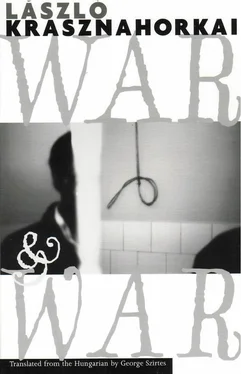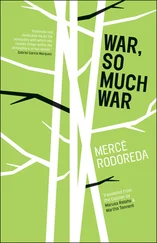Laszlo Krasznahorkai - War & War
Здесь есть возможность читать онлайн «Laszlo Krasznahorkai - War & War» весь текст электронной книги совершенно бесплатно (целиком полную версию без сокращений). В некоторых случаях можно слушать аудио, скачать через торрент в формате fb2 и присутствует краткое содержание. Год выпуска: 2006, ISBN: 2006, Издательство: New Directions, Жанр: Современная проза, на английском языке. Описание произведения, (предисловие) а так же отзывы посетителей доступны на портале библиотеки ЛибКат.
- Название:War & War
- Автор:
- Издательство:New Directions
- Жанр:
- Год:2006
- ISBN:978-0811216098
- Рейтинг книги:5 / 5. Голосов: 1
-
Избранное:Добавить в избранное
- Отзывы:
-
Ваша оценка:
- 100
- 1
- 2
- 3
- 4
- 5
War & War: краткое содержание, описание и аннотация
Предлагаем к чтению аннотацию, описание, краткое содержание или предисловие (зависит от того, что написал сам автор книги «War & War»). Если вы не нашли необходимую информацию о книге — напишите в комментариях, мы постараемся отыскать её.
War and War
War and War
War and War
War and War
War & War — читать онлайн бесплатно полную книгу (весь текст) целиком
Ниже представлен текст книги, разбитый по страницам. Система сохранения места последней прочитанной страницы, позволяет с удобством читать онлайн бесплатно книгу «War & War», без необходимости каждый раз заново искать на чём Вы остановились. Поставьте закладку, и сможете в любой момент перейти на страницу, на которой закончили чтение.
Интервал:
Закладка:
All this, of course, indeed his whole history, originated in the distant past, said Korin, as far back as the time he first announced the fact that though an utterly mad world had made a madman of him, pure and simple, it didn’t mean that that is entirely what he was, for while it would have been stupid to deny that sooner or later, naturally enough, that was how he’d “finish up,” or rather, sooner or later, reach a state resembling madness, it was obvious that whatever might in fact happen, madness was not a particularly unfortunate condition that one should fear as being oppressive or threatening, a condition one should be frightened of, no, not in the least, or at least he personally was not scared of it, not for a moment, for it was simply a matter of fact, as he later explained to the seven children, that one day the straw actually did “break the camel’s back,” for now that he recalled it, the story did not begin beside that certain river but much earlier, well before the riverside events, when he was suddenly seized by a hitherto unknown and unfathomably deep bitterness that resonated through his entire being, a bitterness so sudden that one particular day it simply struck him how bitter, how deathly bitter he was about that which he used to refer to as “the state of things,” and that this was not the result of some mood that quickly appeared then disappeared but of an insight that illuminated him like a bolt of lightning, something, he said, that branded him forever and would remain burning, a lightning-insight that said there was nothing, but nothing worthwhile left in the world, not that he wanted to exaggerate, but that was how it was, there really was nothing worthwhile in his circumstances, nor would there be anything lovely or good ever again, and though this sounded childish, and indeed he recognized that the essential aspect of that which he had distilled from his entire history, was, as he was content to acknowledge, childish, he began to peddle this insight regularly in bars, hoping to find someone that, in his “general state of despair,” he might regard as one of those “angels of mercy,” seeking such a one constantly, determined to tell him everything or to put a pistol to his own head, as he did, he said, without success, thank heaven; so, in other words, though the whole thing was perfectly idiotic, no doubt, that was how it started, with this sense of bitterness that created a whole “new Korin,” from which point on he began to ponder over matters such as how things fitted together, and if their condition were such and such, what the implications might be for him personally, and once having understood that there were absolutely no personal implications, and furthermore, having grasped that he had reached his absolute limit, he then decided that he would resign himself to it, to say OK, fine, that’s how things are, but then, if that was the case, what should he do, give up? disappear? or what? and it was precisely this question, or rather the fact that he approached this question in such a “so-what’s-the-point-of-it-all” manner, that led directly to the fateful day, meaning that certain Wednesday morning when he concluded that there was nothing for it but to take immediate action, this being the direct conclusion he had reached, albeit by a dauntingly difficult route, and the seven of them here were witnesses, he said, still squatting in the middle of the footbridge, to the daunting difficulty of it, right from the time by the river when he first understood the complexity of the world, then by developing an ever deepening comprehension which in someone like him, a local historian of some godforsaken place, involved getting to grips with the inordinate wealth and complexity of possible thought about a world that didn’t exist, as well as with the strength to be derived from the creative power of blind faith, and all this while forgetfulness and the constant terror of losing his head crept up on him, so that the taste of freedom he had enjoyed in the records office might carry him through to the end of his quest, after which there would be nowhere left to go and he would have to decide, and indeed declare, that he himself would no longer allow matters to proceed as they might have wanted to proceed, but mount the stage “as an actor,” not as others around him tended to do, but quite differently, by, for instance, after one enormous effort of thinking, simply leaving, yes, leaving, abandoning the place allotted to him in life, leaving it forever, not simply in order to be in an indeterminate elsewhere, but, or so the idea came to him, to locate the very center of the world , the place where matters were actually decided, where things happened, a place such as Rome, had been, ancient Rome, where decisions had been made and events set in motion, to find that place and then quit everything; in other words he decided to pack up his things and seek such a “Rome”; for why, he asked himself, why spend his time in an archive some two hundred kilometers southwest of Budapest when he could be sitting at the center of the world, since one way or the other, it would be his last stop on earth? and the idea having come to him it began to crystallize in his constantly aching head and he had even begun to study foreign languages, when, one late afternoon, having stayed behind in the records office, vaguely checking the shelves, as he put it, utterly by chance, he arrived at a shelf he had never before explored, took down from it a box that had never been taken down, not at least since the Second World War, that was for sure, and from this box labeled “Family Papers of no Particular Significance” took out a fascicule headed IV.3 / 1941—42, opened it and, in doing so, his life changed forever, for there he discovered something that decided once and for all what he should do if he still wanted to “carry his plan through” and to make “his last good-byes”; something that finally determined him to put all those years of thinking, proposing and doubting behind him, to let those years go, to let them rot in the past, and not to let them determine his future but to act right now, for the fascicule headed IV.3 / 1941—42 had left him in no doubt what should be done, what to do in order to recover the dignity and meaning whose loss he had been mourning, what important thing there remained for him to do, and above all, where he should seek that which he so much lacked: that peculiar, furiously desired, greatest, very last freedom that earthly life was capable of offering.
The only things that interested them, they said the next day while hanging about in front of the Bingo Bar, were the slingshots, the kind used by anglers for laying out bait, not the mind-numbingly idiotic claptrap the geezer spewed continuously, without any prospect of an end, for he was incapable of stopping, so that eventually, after an hour or so of it, it became clear that it was his own repulsive gabble that had turned him into a head-case, though as far as they were concerned, they said, it didn’t add up to anything, so it was completely pointless for him to talk himself into a frazzle, since the geezer meant as much to them as the wind on the footbridge, wind, that, like him, just kept blowing because it was impossible to shut either of them up, not that they gave it a thought, why would they? since he wasn’t worth it, let him talk wind, the only things that mattered being the three slingshots, how they worked and how they would employ them when the six forty-eight arrived, and that was what they’d all been thinking about just before this creep arrived, of the three professional model ground-baiting slingshots they had got as a bargain, for nine thousand Forints, at the Attila József flea market, the three professional German ground-baiting slingshots they had tucked under their bomber jackets, and they wondered how these would perform, for people said their projectile power was vastly greater than that of the Hungarian sort, and, of course, far superior to that of hand-held missiles, some people even claiming that this German gear was not only more powerful but almost ensured that your aim was one hundred percent effective, and that it was, according to its reputation, no argument about it, the best on the market, chiefly because of the track-device, attached to the handle below the fork, that steadied your hand in case it accidentally trembled, thereby reducing the uncertainty factor to a minimum by holding the arm firm all the way to the elbow, or so it was said, they declared, or so they say, but not in their wildest dreams would they have imagined what really happened after that, since this piece of goods was brilliant, its capacity absolutely phenomenal, they said, or so said the four of them who were not among the first to use it, absolutely phenomenal, they said.
Читать дальшеИнтервал:
Закладка:
Похожие книги на «War & War»
Представляем Вашему вниманию похожие книги на «War & War» списком для выбора. Мы отобрали схожую по названию и смыслу литературу в надежде предоставить читателям больше вариантов отыскать новые, интересные, ещё непрочитанные произведения.
Обсуждение, отзывы о книге «War & War» и просто собственные мнения читателей. Оставьте ваши комментарии, напишите, что Вы думаете о произведении, его смысле или главных героях. Укажите что конкретно понравилось, а что нет, и почему Вы так считаете.












